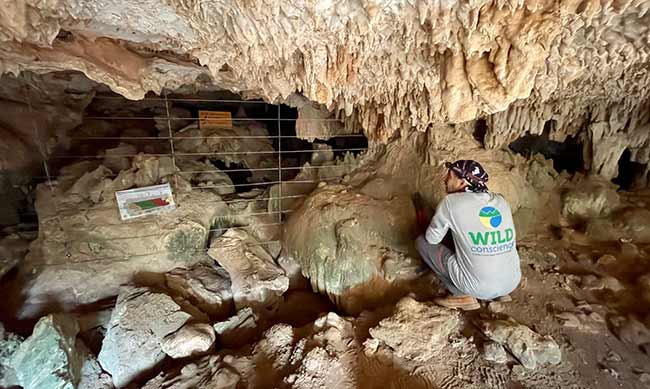Bonaire cave-dwelling bat populations are increasing
During 2019 and 2020, physical barriers were installed at the five most important bat maternity roosts on Bonaire to protect pregnant, birthing and lactating bats from human disturbance. This was a well-informed decision after two decades of scientific research on bats in the ABC islands, which, among others, identified the crucial bat maternity roosts in the three islands, how they are used by the different bat species and what their conservation needs are. Uncontrolled visits were found to be one of the main threats. The fact that one entire island bat population can be nursing in one of these maternity chambers makes them especially vulnerable to this type of disturbance. The Bonairean five cave-dwelling bat species solely give birth to one pup per year after a 4-month-long pregnancy and then lactate for a couple of months. These maternity chambers are their only place to be safe during this time. It’s the master bedroom where all the ‘magic happens.’
Studying the short and long-term effects of barriers
A crucial component of this nature management intervention is to study the short- and long-term effects of these barriers on the bat colonies they are supposed to protect. For this, a quantitative scientific method to collect data on the size of the bat colonies (using infrared light and video recording) for a period of six years was designed by Jafet Nassar (IVIC) and Fernando Simal (WILDCONSCIENCE).
After three years of monitoring, preliminary results look promising. Data extracted from over one thousand 1-minute infrared videos and 54 pictures indicate a positive effect of the barriers on the size of the bat colonies.
Disturbances
But not all is good news. While the bat colonies are increasing in overall size, one alarming finding is the decrease in the number of bats using Cave Orizjan. Near Cave Orizjan, there have been perhaps too many residential and commercial developments in recent years. Disturbances like total vegetation removal and sustained limestone jackhammering less than 100m from this maternity cave could have caused bats to abandon the historic and well-known bat maternity roost. Unfortunately, the developments are still ongoing.
Importance of bats
The reason bats are so important to protect is the vital role they play in the Bonaire terrestrial ecosystem. Nectar-feeding bats are the only pollinators of large cacti, which opens its flowers exclusively at night. These columnar cacti are the sole natural providers of food and water during the harsh dry season, keeping many animals alive when all else has dried out. Due to these fundamental ecological functions, these cacti, together with the bats, are considered ‘keystone species.’ Besides these important bat species, there are also cave-dwelling bats that feed on insects. They keep the Bonaire mosquito population under control by eating tens of thousands of them each night.
Ongoing research
The six years of data collection can be completed if the required funding is obtained. Yet, after three initial years, the (future) bat mothers of Bonaire seem to be eating pickles, breathing through labor contractions, and breastfeeding more peacefully than before, with positive results on the outcome of the so very wanted and welcomed one and only child of the year.
Past and ongoing bat research and conservation in the ABC islands have been made possible by funds and in-kind provided by DierenLot, the Dutch Ministry of LNV, OLB, the Disney Conservation Fund, Bat Conservation International, STINAPA Bonaire, CARMABI, IVIC, FPNA and CARIBSS plus countless hours of fieldwork by volunteers and contracted fieldworkers. On behalf of Bonaire’s nature and its bats, a big thank you to all of them.
For more information on this project, bat research and conservation in the ABC islands, or if you would like to donate to this project, you can contact WILDCONSCIENCE (Wildlife Conservation, Science and Education) at: fernando.simal@wildconscience.com.
(Source: Sophie Zeegers, Photos by Fernando Simal and Sophie Zeegers)









